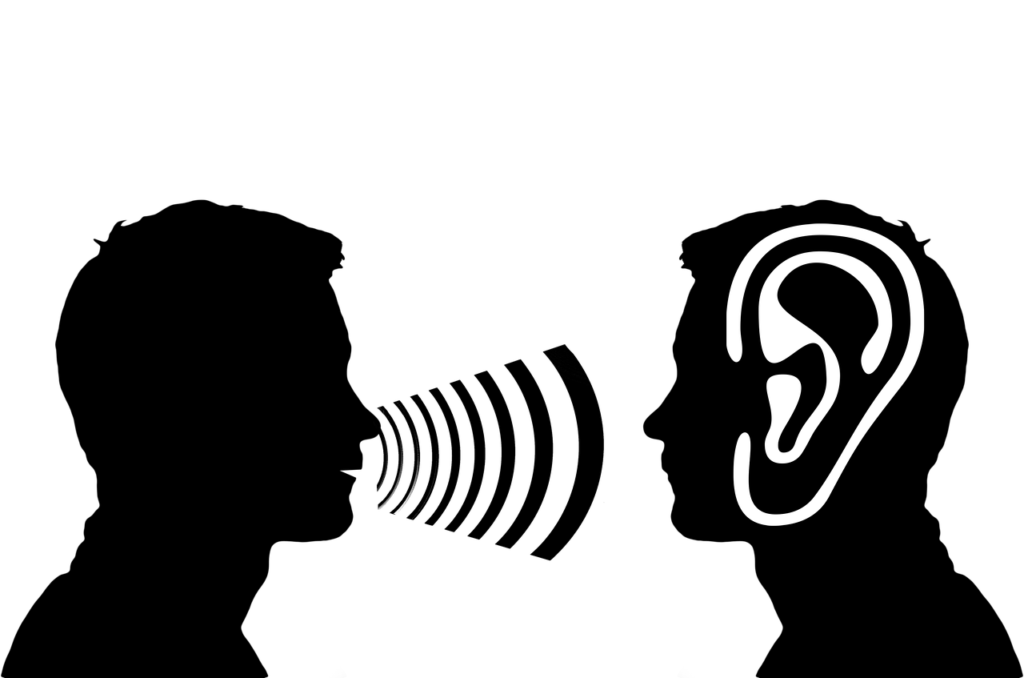The verbs “hear” and “listen” are both used for sound. This is why they can be a little confusing and are often used in the wrong way. But after this simple explanation you will understand how to use them well. At the end try our quick quiz so you can put what you learn into action.
Let’s start with “hear” first.
Hear
Hear is a verb meaning it is an action. Hear is also an irregular verb, meaning that the form changes in the past tense. In the past tense “hear” becomes heard.
We use the word “hear” when sounds come into our ears without paying attention or focusing on the sounds. In fact, most sounds are sounds that you “hear” because it’s hard to focus on all the sounds that come into your ears at once. Think about being in a city, you can hear many things like cars driving by, people taking, or dogs barking but you are not paying attention to all these sounds at once.

Here are some example sentences using the word “hear”
- Did you hear the plane go over our heads?
- She heard the car crash.
- The explosion could be heard across the city.
Hear can be used to also express news that is being told. In this instance, you would use the word hear like…
- “I hear that Jane is pregnant,”
- “I heard t hat Joe lost his job.”
Finally, hear can be used to express who you hear from. For example,
- “I hear from Jane, the her husband is sick.”
- “I heard from my teacher that the test is tomorrow.”
When deciding to use hear think decide whether it is an active effort or is it passive, meaning it just happens without effort.
Listen
Listen is when we are concentrating on and actively trying to hear something.

We can listen to a noise that is happening now, like a song or speech, or we can listen for something or a noise that we are expecting to happen, like the doorbell or footsteps.
You can hear without listening, but you cannot listen without hearing.
Listen is also a verb because it is an action. Listen is a regular verb because you just add -ed to the end in order to make the word past tense. So in the past tense “listen” becomes listened. You would use listen in statements like:
- “Please listen t o the tour guide very carefully.”
“Did you listen to the lecture?”
- “I listened for the door to shut as they left.”
“I listened to the radio this morning.”
Practice Time! (Answers at the bottom)
I can _____ the baby crying. She must be hungry.
a. hear
b. listen
Hey! _____, it’s that spooky sound again.
a. Hear
b. Listen
We _____ the car crash and ran outside to help.
a. heard
b. listened
She was talking very quietly; did you ____ what she just said?
a. hear
b. listen
OK, this is important, so please ____ carefully.
a. Hear b. Listen
So, I know you are all dying to know what you made on the quiz, here are the answers (I am trusting that you did not cheat.)
1. Hear- you would use “hear” in this statement because she was not actively listening for the baby cry but she did hear the sound when it happened.
2. Listen- you would use “listen” here because the person making the statement is trying to get you to actively pay attention to a noise.
3. Heard- again, you would use “heard” ( hear in the past tense) because the noise came to you even though you were not listening for it on purpose.
4. Hear- you would use “hear” because it is asking if you could hear the sound that the person was making, you were not intentionally listening for what they said.
5. Listen- you would use “listen” in this sentence because you are asking someone to pay attention carefully to what is being said.
Ok, let's review!
Just to recap, keep in mind that hear i s passive and just happens to you, whereas listen means you are actively trying to hear a noise.


Thanks for the post!